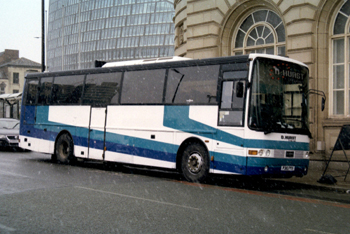The rail regulator has called on train operating companies (TOCs) to ensure that rail replacement vehicles are more suitable for people with physical disabilities.
The Office of Rail and Road (ORR) said its new accessible travel guidance includes a requirement for improved information so passengers know where and when accessible vehicles will be operated.
It pointed out that while ‘the vast majority’ of buses used for rail replacement are accessible to people with physical impairment, by being equipped with low floors and/or ramps for wheelchair users for instance, historically the opposite has been true of coaches where a wheelchair lift is required.

Coaches are less likely to be accessible
The ORR said it expects all TOCs to take appropriate steps to comply with Public Service Vehicle Accessibility Regulations (PSVAR) and is working with the Driver & Vehicle Standards Agency (DVSA), which enforces these regulations.
The two organisations are planning a memorandum of understanding to clarify and strengthen the respective monitoring and compliance activities.
The ORR’s deputy director, consumers, Stephanie Tobyn, said: ‘ORR’s objective is to ensure that all passengers can request and receive assistance to travel safely with confidence and ease.
‘Our updated guidance makes clear that train companies are responsible for obtaining accessible vehicles during rail disruption, and for providing passengers with useful information on where and when accessible vehicles will be used. In all circumstances, whether the vehicle used is a bus, coach or taxi, waiting times for passengers should be similar.
‘We have also written to the rail industry setting out a range of additional proposals and suggestions for further improvements from respondents to our public consultation, as well as our proposal for an industry forum to help identify and better manage the availability and use of PSVAR-compliant vehicles at times of high demand.’
The ORR said its revised guidance follows consultation and detailed discussions with stakeholders including the Equality and Human Rights Commission and the Disabled Persons Transport Advisory Committee.
It requires:
- new rules to ensure that train operators using rail replacement services seek to secure accessible vehicles from bus and coach companies;
- improved passenger information during disruption to ensure passengers know where and when accessible buses and coaches will be operated;
- reinforcement of an existing requirement that where needed, passengers are offered an appropriate alternative arrangement, including a different form of accessible road transport such as a taxi;
- for planned disruption, ORR has introduced a new requirement that waiting times for rail replacement services should be similar, irrespective of whether the vehicle used is a bus, coach, taxi or other alternative; and
- explicit references to the legal requirement for rail replacement bus and coach services to comply with the PSVAR unless a special authorisation is obtained from the transport minister.
Register now for full access
Register just once to get unrestricted, real-time coverage of the issues and challenges facing UK transport and highways engineers.
Full website content includes the latest news, exclusive commentary from leading industry figures and detailed topical analysis of the highways, transportation, environment and place-shaping sectors.
Use the link below to register your details for full, free access.
Already a registered? Login